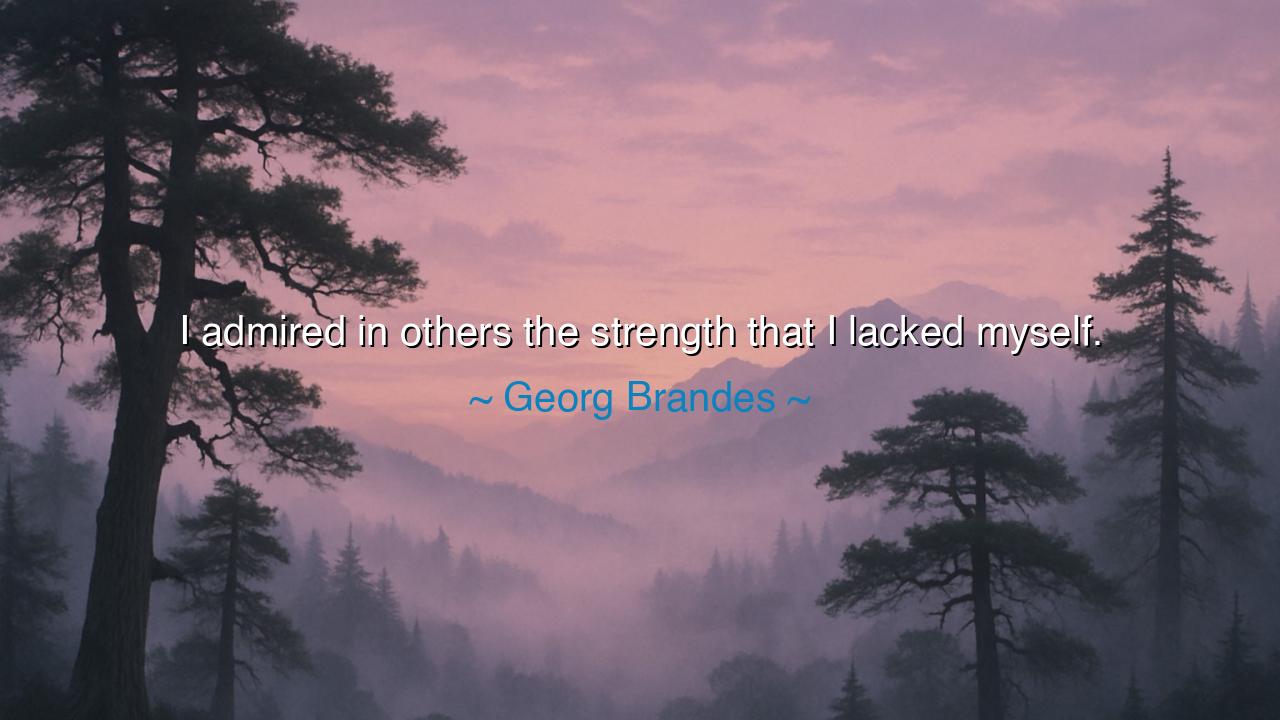
I admired in others the strength that I lacked myself.






Hear the voice of Georg Brandes, the great Danish critic and thinker, who once confessed with piercing honesty: “I admired in others the strength that I lacked myself.” These words carry the weight of humility, the candor of self-awareness, and the wisdom of one who knew that admiration is itself a mirror of the soul. For what we praise in others is often the very thing we hunger for in ourselves. To recognize this is not weakness, but the beginning of transformation.
The origin of this saying lies in Brandes’s lifelong journey through the world of literature and philosophy. He lived in the 19th century, a time of great upheaval in thought, when old certainties were collapsing and new ideas were storming into Europe. Brandes, though brilliant and influential, often felt his own limitations—he was not always the fiery reformer or the fearless doer. Instead, he was the observer, the critic, the voice that admired the courage of others while quietly acknowledging his own restraint. His confession reveals a timeless truth: that even the wise and the strong carry within themselves hidden frailties.
History provides us with examples of this noble honesty. Consider the story of Mahatma Gandhi, who often admitted to his own fears and doubts. Gandhi admired the raw courage of warriors, though he himself chose the path of nonviolence. He lacked the appetite for battle, yet he drew inspiration from those who stood fearless before danger. In acknowledging this, he did not diminish himself, but instead reshaped strength into a new form—moral power. Thus, like Brandes, he showed that admiration of others’ strength can become the foundation for one’s own unique form of greatness.
There is a deep wisdom here: admiration is the seed of aspiration. When we look upon another and feel awe at their courage, their endurance, or their resilience, it awakens in us the recognition of what we too might become. To admire is to glimpse a reflection of possibility. Though we may lack today the power we see in another, admiration stirs us to cultivate it. Brandes reminds us that longing is not futility; it is the first step toward growth.
Yet we must not mistake his words for despair. To admire what we lack is not to live in envy, but to live in humility and openness. The proud man believes he needs nothing from others; the wise man learns by watching, listening, and honoring the strength he does not yet possess. In this way, Brandes’s words are a call to live with honesty: to acknowledge our gaps without shame, and to let the greatness of others ignite us, rather than diminish us. For there is no weakness in admiration—only the courage to see truth in ourselves.
The lesson is clear: when you admire the strength of another, do not stop at wonder. Ask yourself what draws you to that quality, and seek to cultivate it within. If you admire patience, practice restraint. If you admire courage, take small steps into your own fears. If you admire wisdom, devote yourself to learning. In this way, admiration becomes not a mirror of lack, but a map toward fulfillment.
Practical action must follow. Look upon your companions, your heroes, your teachers, and notice what in them awakens awe within you. Do not despise yourself for lacking it—rejoice that your heart can recognize greatness. Then begin the slow and steady labor of embodying it. You need not become them, for their strength is theirs; but you may grow into your own, inspired by theirs. In this lies the path from weakness to resilience, from longing to achievement.
Thus, O seeker, take Brandes’s confession into your heart. To admire is not to bow in defeat, but to stand at the threshold of transformation. What you see in others is the light that may one day shine in you. Cherish that light, nurture it, and let it lead you forward. For in the end, the strength you lacked may become the strength you gain, and the admiration you once offered may one day be offered to you. This is the wisdom of the ancients, spoken again through the honest lips of Georg Brandes.






AAdministratorAdministrator
Welcome, honored guests. Please leave a comment, we will respond soon